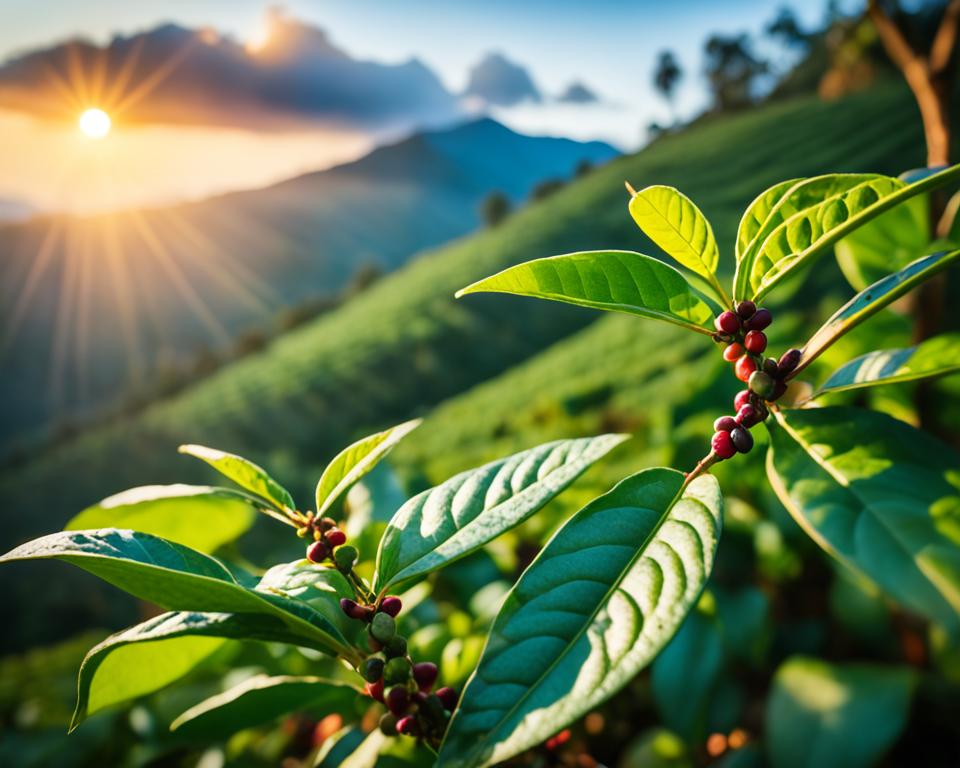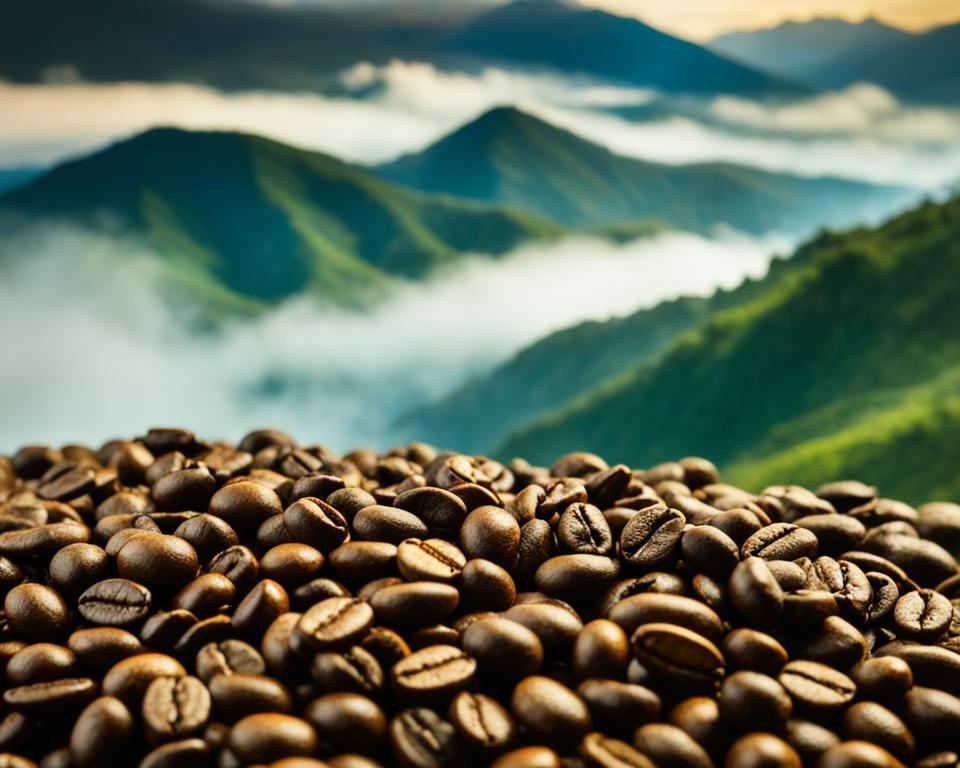Did you know Kenya makes more than 50,000 metric tonnes of coffee a year? It’s a big player in the world’s coffee scene. This fact got me really curious. I wanted to learn all about what makes Kenyan coffee special. So, I started a journey that led me to the heart of Kenya’s coffee culture. Today, I will share my Kenyan coffee taste.
Tasting Kenyan coffee has been amazing. I’ve met local farmers who are so passionate about their crops. Each sip has a story to tell. From the first taste, I knew this coffee was unique.
My travels included visits to farms and lively coffee tours in Nairobi. There, I saw the love and effort that’s put into every single coffee bean.
My journey has been more than just finding great coffee. It’s about connecting with the people and places behind each cup. I want to share my story with you.
It shows how Kenya’s land and the hard work of its people make their coffee famous. Join me as I highlight the unique journey that is Kenyan coffee.
Key Takeaways
- Kenya produces over 50,000 metric tonnes of coffee annually, playing a pivotal role in the global coffee market.
- The experience of Kenyan coffee taste offers a deep cultural and sensory journey.
- Authentic Kenyan coffee is defined by diverse, complex flavour profiles originating from unique geographical conditions.
- Nairobi’s coffee tours provide insight into the urban coffee culture and its integration with traditional practices.
- Farm visits highlight the meticulous care and dedication of local farmers towards producing high-quality coffee.
The Origins of Kenyan Coffee
The story of Specialty Coffee Kenya takes us back to its early years. We’ll see how its special taste developed through time and tradition.
The History of Coffee Production in Kenya
In the 1880s, Kenyan coffee’s tale began with the arrival of Arabica plants. This came thanks to missionaries who saw the potential in Kenya’s soils.
Even though coffee started in Ethiopia, it was Kenya that truly flourished in coffee excellence.
Into the 1900s, Kenya’s coffee became a star, supported by the government and co-ops. These co-ops helped with quality and fair farm prices.
As Kenyan coffee became globally known, its mark in the specialty coffee market grew strong.
The Geographical Influence on Flavour
Kenyan coffee’s flavours are closely tied to its land. From the tall mountains to the vast valleys, it’s a perfect place for coffee. The soil, full of minerals from old volcanoes, and great climate make for ideal coffee growing.
Talking about Kenyan coffee means discussing its unique earth and climate mixes. Different areas in Kenya offer varied tastes, thanks to altitude variations.
Usually, Kenyan coffee has a lively taste, a full feel, and hints of berries or citrus because only the best cherries are picked by hand.
Experts in Kenyan farming say it’s this special land that makes great Kenyan coffee.
Its flavours are the reason why people from all over love African coffee tastings.
Why Kenyan Coffee is Considered the Best
Kenyan coffee is known worldwide for its top-tier quality. It is loved by many who enjoy fine coffee. To understand its global fame, we explore its unique flavours and the farming methods that make it top-notch.
Unique flavor Profiles
Kenyan coffee stands out due to its complex flavors. It can taste bright and fruity or savoury and spicy. These distinctive flavours come from the unique ways Kenyan farmers grow and process their coffee beans.
Brewed Kenyan coffee might remind you of blackcurrant, berry, or wine. The flavours are not just unique but are always of high quality, giving a remarkable taste experience.

High-Altitude Farming
Farming coffee high above sea level in Kenya is key. This elevates its acidity and unique aromas. Most of Kenya’s coffee farms sit between 1,700 and 2,000 metres up.
This height, plus volcanic soil and the perfect climate, is ideal for coffee. Its altitude slows cherry growth, enhancing flavour and acidity. These are vital for the best Kenyan coffee.
Kenya’s natural blessings, combined with farmers’ dedication, create truly exceptional coffee. This makes it a favourite among people who appreciate high-quality coffee around the world.
The Process of Coffee Production in Kenya
Discovering how coffee goes from a bean to your cup in Kenya is truly eye-opening. It shows the mix of old traditions and new technology in making every drop of single-origin Kenyan coffee.
This mix marks the unique way coffee is made in Kenya.
From Bean to Cup: The Journey
It all starts with choosing the best coffee cherries, done by hand. Then, these cherries are separated, and the outer part, the skin, is taken off. After that, the beans go through a special process to clean them up.
This includes removing a sticky layer, washing, and letting them dry under the sun on high beds.
Kenya mixes old and new ways of making coffee perfectly. For drying, some beans are dried outside on high beds, a long-loved method. Nowadays, some use machines to dry the beans faster. Both ways have their upsides.
The old way helps the beans dry evenly, while the new way handles larger loads and keeps the beans’ quality high.
| Aspect | Traditional Methods | Modern Techniques |
|---|---|---|
| Drying Method | Sun-drying on Raised Beds | Mechanized Drying |
| Quality Control | Manual Inspection | Automated Systems |
| Sustainability | Eco-friendly Practices | Efficiency and Resource Management |
| Flavor Profile | Rich, Deep Complexity | Consistent and Controlled |
Kenyan Coffee Taste: My Personal Experience
Exploring Kenya’s rich coffee culture was amazing. I visited several local coffee farms. They are often passed down in families and show the hard work behind each cup.
Visiting local Kenyan coffee farms
Each farm I visited showed me the hard work and love behind Kenyan coffee. I saw coffee plants being picked by hand.
The farmers shared their stories, and their pride was clear. This tradition means every coffee bean gets the best care.
Participating in a Nairobi Coffee Tour
After the farms, I took a tour of Nairobi. It was full of life and showed how city dwellers enjoy coffee. The guides told us about Nairobi’s coffee history and its modern scene.
Tasting Notes: Aromas and Flavors
Finally, I got to taste the coffee. The aromas ranged from fruity to earthy. Each cup had its own story. The taste was varied, from bright to rich.
This experience deepened my love for Kenyan coffee and its diverse flavours.
FAQ
What makes Kenyan coffee unique?
Kenyan coffee is famous for its lively, fruity taste and high acidity. Its special flavours come from the country’s rich land and perfect climate. Both the soil and the weather help create these tasty profiles.
What is the best way to enjoy Kenyan coffee?
I enjoy Kenyan coffee best through pour-over brewing. This method brings out its diverse flavours well. Also, coffee lovers should visit specialty shops. The baristas there serve excellent Kenyan coffee.
Can you visit coffee farms in Kenya?
Yes, you can! Exploring Kenyan coffee farms offers insight into the bean’s journey. Visitors can learn about farming and processing firsthand. Plus, Nairobi offers coffee tours, showcasing its rich coffee culture.
How is Kenyan coffee produced?
Kenyans pay a lot of attention to how they grow and pick coffee. They handpick their best cherries. Then, they process them carefully, either the traditional way or using new machines. This care guarantees top-quality coffee beans.
What are the typical tasting notes of Kenyan coffee?
Kenyan coffee stands out for its sharp acidity and fruity flavors. It can taste like berries or even have spicy or citrus hints. Every sip offers something different and exciting.
How Does Kenyan Coffee Compare to Central and South American Coffee in Terms of Flavor?
Kenyan coffee is renowned for its vibrant acidity and fruity notes, often showcasing flavors like berry and citrus. In contrast, Central and South American coffee typically presents a smoother, nuttier profile with chocolate undertones. Thus, tasting Kenyan coffee offers a flavorful comparison of central and south coffee that delights enthusiasts.
Is high-altitude farming important for Kenyan coffee?
Definitely! Growing coffee at high altitudes, over 1700 metres, is key. It causes the beans to mature slowly. This slow growth boosts their acidity and makes the flavours more complex.
What are some of the best Kenyan coffee brands to try?
If you’re looking for great Kenyan coffee, AA Coffee and Peaberry Coffee are top choices. They’re famous for their quality and flavorful beans. This is a great pick for anyone who loves coffee.




